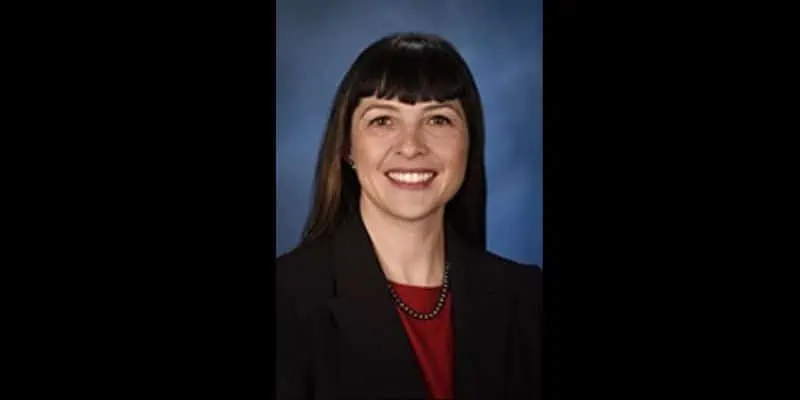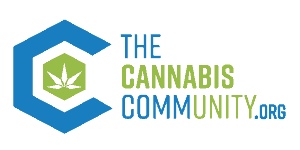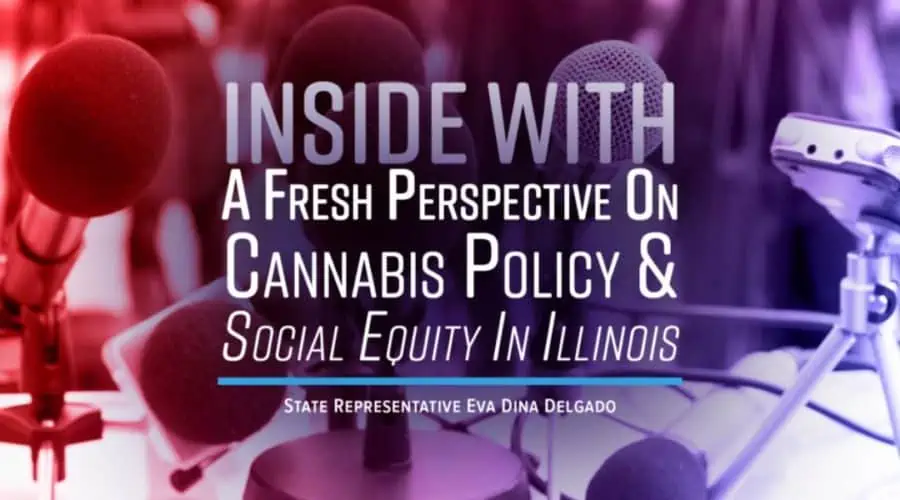Illinois Cannabis Policy and Social Equity: a Fresh Perspective with State Representative Eva Dina Delgado
In this episode, Hosts Abraham Villegas and Mark Peysakhovich interview a special guest, Illinois State Representative Eva Dina Delgado to discuss Illinois cannabis policy updates and outlook on the future.
Illinois State Representative Eva Dina Delgado is an attorney with more than 20 years in public and private sector leadership. She has worked for the City of Chicago and the Chicago Transit Authority (CTA), as the Director of Governmental and Public Affairs and Community Outreach. Her story is the quintessential American Story: Her parents came to this country as immigrants with nothing and sacrificed for their kids.
Now their daughter is a State Representative! All these various experiences shape Rep. Delgado’s perspective on cannabis. She is a seasoned public and private-sector lawyer. She has worked in government and has deep insights into how the bureaucracy and its public agencies operate. As a woman of color and a daughter of immigrants, she understands the impact of institutional racism and the need for greater equity. Watch or listen to the conversation and let us know what you think!
Table of Contents

Representative Eva Dina Delgado 00:22
- She will discuss a fresh perspective on cannabis policy and social equity in Illinois.
- Abraham welcomes her to the show and asks her to introduce herself.
- She is a state representative appointed to her seat in November 2019.
- Her parents moved to Chicago to be part of her experience as a state representative.
Representative Delgado’s perspective on cannabis policy 01:04
- Cannabis is an important issue for Representative Delgado’s constituency because it can bring revenue to the state.
- Her constituents see cannabis as part of the solution to provide certain things to them.
- Cannabis legislation passed in 2019 created the R3 program, which is renew, reinvest, restore. Vast amounts of money are being pumped into that program, and the first set of awards has just been issued.
- The R3 program is social equity-focused, and it is a way to drive more revenue that is different from what the state has been doing in the past.
- Belmont Cragin is one of the first areas to receive an award from the R3 program.
Representative Delgado’s education on cannabis policy 06:34
- Representative Delgado was tangentially aware of cannabis legislation before she was appointed to her seat.
- She was excited to see how social equity was at the forefront of the conversation in Illinois, and that Illinois was breaking ground on making the most social equity-focused cannabis legislation in the country.
- She was in the legislature when the implementation of the legislation was happening.
Impact of COVID-19 on cannabis policy 07:06
- The impact of COVID-19 on cannabis policy is not discussed in this part of the video.
Slow implementation and need for improvement 07:09
- Illinois cannabis policy implementation has not been seamless
- The rollout that was supposed to begin on May 1st was delayed
- The delay affects social equity applicants seeking dispensary licenses
- The administration’s implementation process is under scrutiny.
- There is recognition that there are always ways to improve the process
- The administration has received credit for putting the policy out
- As a legislator, there is a continued effort to find ways to improve the policy
Using cannabis tax dollars to help communities 07:49
- The speaker is excited about the prospect of cannabis tax dollars helping communities
- There is a belief that cannabis can help heal people and communities
- The Safer Foundation, which does excellent work, is singled out for its efforts in this area
- The speaker’s wife consults with the Safer Foundation
Licensing delays and frustration 09:08
- Licensing delays have affected thousands of people, particularly people of color
- Dispensary licenses were due in May, and craft grow, infusion, and transportation licenses were due on July 1st
- There is a sense of frustration among applicants who are losing money
- There is a perception that white sharks are circling, taking advantage of these delays
- There is a need for the legislative branch to fix some of these issues
Latino caucus priorities 10:47
- The Latino caucus has been engaged in this issue since the summer of last year
- The caucus wants to ensure diversity and participation in the industry
- Latino ownership and employment are important priorities
- There is an opportunity to build wealth in these communities
- Getting the work done has been difficult due to COVID-19
- Time is an enemy, and the longer it takes to address the issues, the longer it takes for people who need opportunities to benefit.
Illinois cannabis policy implementation issues 14:47
- The implementation of Illinois cannabis policy has faced issues such as math mistakes and other errors.
- The law is imperfect, but it is a pretty good law.
- The state could have done better in implementing the policy, and an outside contractor could have done a better job.
- Despite the issues, Illinois has created 3,000 jobs and generated $100 million in tax money.
Lottery system for social equity licenses 14:27
- Illinois has a lottery system for social equity dispensary licenses.
- The lottery system has faced issues; the faster they are fixed, the better it is for everyone.
Two lotteries for cannabis licenses 16:15
- There are two lotteries for cannabis licenses.
- The first lottery is for perfect scores, while the second lottery has a cutoff percentage.
- There is still a lot of policy discussion about the number of licenses to be issued.
Delivery as a big conversation 19:44
- One of the reasons for a black marketThe illegal or unregulated market for cannabis where product... for cannabis is the ability to get door-to-door delivery.
- Delivery is a big conversation that needs to be had.
- There is still a black market for cannabis, and delivery is an excellent way to combat it.
Moving past the lottery 19:30
- The lottery system needs to be fixed, and the state needs to move past it.
- More issues need to be addressed, such as craft grow and transportation.
- The state needs to address the black market for cannabis, and delivery could be effective.
Pressure to move forward 20:31
- The legislature is not always the fastest moving, but the pressure needs to be kept on.
- Social equity applicants have done a fantastic job keeping pressure on the legislature.
- A quick fix is needed to move to the next step.
Social Equity in Cannabis 24:21
- There is a lot of debate on who qualifies for social equity and its criteria.
- We are still stuck in these conversations instead of getting to actual solutions.
- Incrementalism is the worst thing that we could be exploring at this stage.
Successful Social Equity Program 25:01
- There is no right answer to what a successful social equity program should look like.
- It is important to look at it through the lens of folks that we represent.
- They want to see inclusivity and opportunity.
- Anyone who lives in neighborhoods should have an opportunity to work in the cannabis industry.
- Social equity applications are a first step, but there is still a lot more to be done.
- Programs are being offered at community colleges to learn about the industry, business, and horticultural side of it.
- It’s being able to get that education and participate in a program.
Legislative Session 21:51
- The speaker points out that committee hearings are five days a week instead of two or three.
- The legislative process allows us to make the policy better continually.
- It won’t be perfect, but we will continually improve it.
Issuing Licenses 21:55
- There is an urgency to issue licenses and move on to the next step.
- It will happen, and it’ll probably happen in this session.
- The session will be strange, but the intention is to issue licenses.
- There is a lot of work going on to make it happen.
Cannabis Community’s Pressure 20:56
- The cannabis community has been a great source of pressure, reminding us that we still have work.
- They’ve been incredibly patient and have pushed lawmakers to make it happen.
- We need not let the community get swept up in other things and remind them that we still want them to be a part of the industry.
Importance of Opportunity and Equity 27:30
- The speaker emphasizes the importance of opportunities and equity in the cannabis industry.
- She believes everyone should have access to opportunities in the industry, regardless of their background or socio-economic status.
- She compares this idea to the immigrant story and how people come to the United States for more opportunities.
Understanding Social Equity 28:00
- The speaker believes that equity has become a buzzword and that people don’t fully understand it.
- She wants everyone in her community to have access to education or employment opportunities.
- She believes there is still much work to be done regarding social equity.
Opportunities in Plant-Touching Business 28:43
- The conversation focuses on social equity in plant-touching businesses, such as retailers, cultivators, and delivery services.
- The speaker believes that delivery services are particularly exciting because they can be profitable and accessible to members of the community who don’t have political connections or startup capital.
- The speaker believes that there are real opportunities in the cannabis industry, but they require innovation and creativity.
Comparing Cannabis to the Alcohol Industry 30:07
- The speaker spends a lot of time comparing the cannabis industry to the alcohol industry.
- She believes that the two industries have dealt with similar barriers and misunderstandings.
- She believes the cannabis industry will continue to innovate, much like the alcohol industry.
Importance of Infrastructure 31:54
- The conversation shifts to the importance of infrastructure in the cannabis industry.
- The speaker believes that companies building new facilities, such as the one in Skokie, provide opportunities for diversity and equity.
- The speaker has experience working in infrastructure and believes broadening our vision beyond just the plant is essential.
Wrap-Up 33:46
- The conversation ends after going over the promised 30-minute time frame.
- The hosts thank the state representative for her insights and expressed their appreciation.
Did you enjoy this episode? Watch more show interviews!

